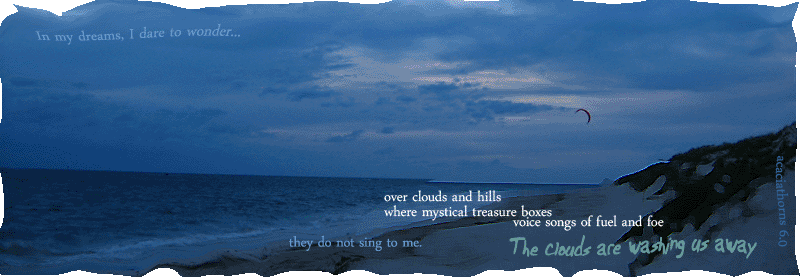The problem with thinking too much about postmodernism is that you fall into the trap of uncertainty. You're in a loop which you can't escape because suddenly nothing has meaning without everything else, and thus, in some ways, you can only exist in relation to others. And some would argue that postmodernism questions capitalist ideology! But I suppose comparisons do not equal competition.
I'm not surprised, that towards the end of this university course I too have fallen into the trap of uncertainty. It is hard being with someone who seems to know everything, I once told a friend of mine, and it's no lie. You find yourself in situations where you feel like the extra wheel even though you shouldn't be the third person at all. But I suppose it's not all like that. Sometimes it is just that you don't think you should be with someone who is so much 'higher' than you.
But maybe it's not at all: which is all the more likely. Perhaps this uncertainty is based on the fact that you have never truly been addicted to something. I suppose the closest thing to addiction I came to was Harry Potter and even that was superfluous. Then you realise that you no longer 'like' things. Everything is a mild 'nice' or a blatant 'hate'. Everything (mostly myself) feels hollow. But maybe it is true. Maybe it is all in the mind and I should just let go of all my postmodern restrictions and pretend that something is in its absolute.
Ultimately, the absolute of uncertainty is paradoxical. I wish I could just escape out of this loop.
How do you kick the habit?
Thursday, 29 May 2008
The distress signal
Scribbled by
Timystic
at
20:41
|
0
Whispers
![]()
Sunday, 4 May 2008
Somewhere along the Moebius strip
It was like walking into chaos: a hidden world of absolute certainty, precision and ritual. For the casual chaotic, these perfectly structured world was somewhat of an oddity- an element which seemed incomprehensible and yet strangely attractive. I was seduced by its certainty, its possibility for repetitiveness, and therefore his perfect sense of self-identity. For someone whose life had filled with transient activity, the grounded nature of his personality and identity was both deeply unsettling and strangely seductive. Peering into his life like a little child staring into a sweet shop whilst being dragged away by a frustrated parent, I felt frustrated with my own insecurity, instability and fluid self-identity.
I suppose, when you finally can understand the frustrations that surround you, you can start to tackle and solve the problem. In assessment of these concerns, it would be obvious to somewhat construct likes & dislikes, and fight towards some sort of direction that I would like to head in. But how do you begin to find out what is interesting and what is not without referring to 'the others' in your mind? Which steps need to be taken as to not compare yourself with him? How can you start afresh without knowing what it is you like and what you've told yourself to like in order to enact out the lives of others in a vain attempt to discover a self-identity?
I feel like there is no border, for myself, around the I. Within the I there is a million different people, each whose thoughts filter through and construct what I should/do know. How fragments fit together and make a puzzle is not seen through the ideas in themselves, but how different people interact with them. It is not the idea by itself then, for me, but how different individuals interact with that idea. Can you truly separate the two? I had never thought so before.
Where to begin?
Scribbled by
Timystic
at
12:18
|
1 Whispers
![]()

